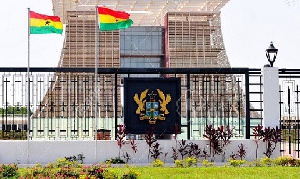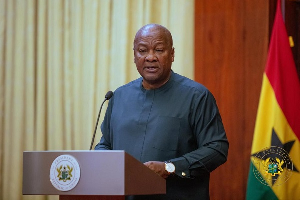Four envoys representing Switzerland, Botswana, New Zealand and Pakistan Tuesday presented their letters of Credence to President Nana Addo Dankwa Akufo-Addo at the Jubilee House in Accra.
The four envoys all harped on the need to deepen the ties and cooperation between their respective countries and Ghana, particularly in the areas of trade, investment and technical cooperation.
The Pakistani High Commissioner to Ghana, retired Major General Wagar Ahmad Kinggravi spoke about the cordial diplomatic relations between the two countries, stating his determination to further strengthen those ties.
He said Pakistan was committed to fostering its economic, social and political relations with Ghana.
"Our two great people are well familiar with each other's system and ways of business and trade. We can share our experience in agriculture, education, medical, Information Technology, Engineering and military fields," Maj. Gen Kingravi said.
With the advantage of English being a common language for communication in both states, the High Commissioner disclosed that Pakistan was eager to invite Ghanaians to take advantage of the conducive environment in textiles, cement and a whole range of agro-based industries.
"We would also like to participate in joint ventures in the field of fertilizer and oil/gas development," he added.
The Pakistani envoy who also has concurrent accreditation to Gabon, Cameroon, Benin and Equatorial Guinea since 2018, commended President Akufo-Addo's leadership, which he said had buttressed global acceptance of Ghana as one of the most stable democracies in Africa.
The Swiss Ambassador to Ghana, Philip Stadler, on his part was positive that the bond between Ghana and Switzerland that dated back many years would blossom into a more fruitful relationship.
He noted the excellent economic cooperation between the two countries since 2002, hoping that his stay in Ghana would contribute to the diversification and deepening of trade and bilateral ties.
Mr Stadler noted that although Swiss companies run their business and investment decisions very independently from the government, that fact would not interfere with the overall quest to deepen trade relations between the two countries.
He also lauded President Akufo-Addo for the impressive and sustainable economic development in Ghana, saying, "I am impressed about the economic development in the last decade and the growth forecast for 2019. Ghana gained Middle-income country status, sound and prudent macroeconomic policies and a strong private sector".
New Zealand's High Commissioner to Ghana, Mark Ramsden, assured of his country's commitment to tighten trade and economic cooperation with Ghana.
"New Zealand sees the scope to deepen trade and economic cooperation and links amongst Commonwealth members, he said, stating that his country would pursue relentlessly that agenda at this year's Commonwealth Heads of Government's meeting.
The envoy raised the issue of climate change and was happy that both Ghana and New Zealand recognized the threat that climate change presented and was working to address the challenge.
Ambassador Pule Batimanki Mphothew of Botswana told the President that Ghana was a strategic development partner to his country.
He said even though bilateral relations between the two nations was excellent, there was a need to further strengthen that cooperation to move both countries to a higher level of development.
President Akufo-Addo who placed value on the relations between Ghana and the four countries said the content of the relations ought to be transformed and strengthens economically through extensive trade for the mutual benefits of the peoples of Ghana and that of those respective nations.
He asked the countries to increase investments in Ghana and get their businesses communities to collaborate with local industries in the country to add value to raw materials to lend a boost to the nation's industrialisation drive and export development.
General News of Wednesday, 3 July 2019
Source: ghananewsagency.org

















